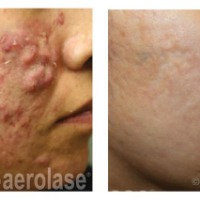Melasma is a skin condition that commonly occurs in women. It produces brown skin pigmentation or patches that are most often found on the forehead, cheeks, nose bridge, upper lip, and chin. They can also occur on the neck and forearms. It's often referred to as the mask of pregnancy and for those who suffer with it, the concern is mainly cosmetic.

Model Photo
A new product line from the makers of the eMatrix sublative rejuvenation device, Elure is giving patients lighter, brighter skin. Elure uses the bio-active substance Melanozyme to break down melanin and even skin tone. Dermatologist Dr. Tess Mauricio says, "Elure is a non-hydroquinone skin lightening product and it really can be the answer to my patients wanting a skin lightener that is safe, quick to use and actually works." She says that Elure is good for patients who have skin discoloration from sun spots or melasma and is also great for those who want brighter skin in general.
Some people have also employed the use of home remedies to improve the effects of melasma on the skin, although the effectiveness of these home remedies is largely unproven. One remedy involves rubbing lemon juice on the face and leaving it for a total of 15 minutes and then rinsing it off. The acidic and bleaching properties of lemon juice may help promote the fading of the brown skin patches. Applying body lotions is also a good regimen for skin melasma, and scar-removing creams such as Be Gone can also help fade the brown areas of the skin.
Fractional lasers are another option for melasma that stimulates the growth of new, healthy skin. Target skin areas are dealt with at microscopic levels and are treated with heat. The laser blasts the skin with millions of tiny beams of light that actually vaporize the skin and stimulates new growth. When new skin grows, it's healthy and rejuvenated and free of discoloration. The columns of light leave areas of undamaged skin in between them for faster healing than with older technology that used a solid band of light.







